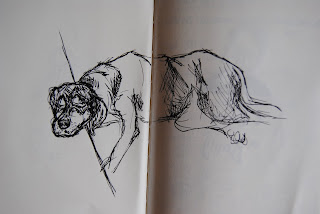Within my animation I aimed to explore the everyday of abandoned dogs, not so much in what they do everyday, but the idea that dogs are abandoned everyday in London. As previously mentioned because we do not see stray dogs roaming around the city as in others abroad (eg barcelona) it is easy to believe that the abandonment of dogs is uncommon, however this is not true. For this reason I visited Battersea Dogs and Cats rescue home who take in abandoned animals daily, and also noticed that some breeds (notably Staffordshire Cross) were much more common than others, as well as visitors tending to not even look at these breeds. All of which I wanted to convey in my animation.
My final animation depicts a dogs who is abandoned, a Staffordshire Cross specifically to illustrate their commonality within Battersea and dogs homes alike. The initial scene where the dog has its support of its owners' hands removed and plummets is intended to convey the dog being abandoned. I decided to keep this fairly vague, simply showing the hands being drawn away, because to start alluding to reasons and ways that dogs are abandoned was not something that I wanted to explore in the animation. Inspired by Gabriel Orzoco's 'Dial Tone' I created a digital sea of statistics concerning dogs abandoned in London collated from various abandoned dogs databases I found on the internet. Taking the form of a sea illustrates how vast these databases are and in turn the large amount of dogs being abandoned; the dog being submerged in this signifies that it has now become a part of this database. This is reiterated as the data transforms into bars and forms a cage around the dog, confined and restricted by being little more than another abandoned Staffordshire Cross, as well as the physical cage. The dog is now rendered in pencil, setting up a contrast from the previous watercolours which were used, thus highlighting again how it is no longer unique or any different from the other dogs. Further enforced by having only one visitor glance at the dog but quickly fade and two faces turn away, representing the visitors that I observed at Battersea. They are also in pencil and disappear as ink in water to portray both their fleeting and elusive nature, and the sombre atmosphere within the dogs home. The circular motion of the dog is a subtle hint at the cycle and ongoing nature of abandoned dogs, and followed by the end scene where the dog is becomes simply another statistic. The animation was shot in 16:9 a popular format at the present time, signify that the abandonment of dogs is currently occurring, not just in past years. For the audio I used a sound piece which I recorded on one of my visit to Battersea. The many dogs barking illustrates the sheer amount that are abandoned but also as they are not represented visually, the notion of visitors not even looking at particular dogs is echoed, by forcing the audience into doing the same thing. The sound of the dog whining evokes empathy from the audience, conveying the fairly sombre and sad tone that the animation has. I am fairly pleased with the final outcome, however I think that aesthetically, the animation could be improved, not only by the quality of the drawings in areas, but also in shooting; the exposure in certain parts needs to be adjusted, and the paper edge can also be seen.


























